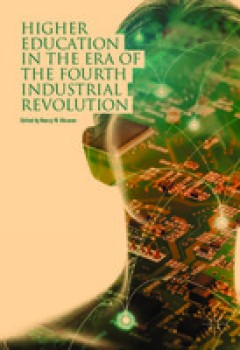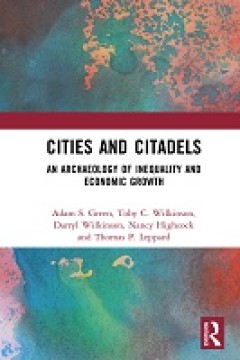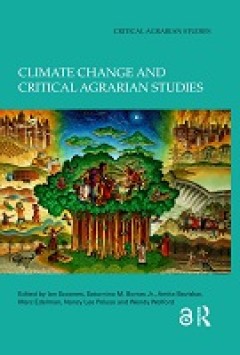Ditapis dengan
E-book Eyewitness Travel: Budapest
- Edisi
- -
- ISBN/ISSN
- 9780241263198
- Deskripsi Fisik
- 278 halaman, ilus.
- Judul Seri
- -
- No. Panggil
- 910 OLI e
- Edisi
- -
- ISBN/ISSN
- 9780241263198
- Deskripsi Fisik
- 278 halaman, ilus.
- Judul Seri
- -
- No. Panggil
- 910 OLI e

E-Book Higher Education in the Era of the Fourth Industrial Revolution
This open access collection examines how higher education responds to the demands of the automation economy and the fourth industrial revolution. Considering significant trends in how people are learning, coupled with the ways in which different higher education institutions and education stakeholders are implementing adaptations, it looks at new programs and technological advances that are cha…
- Edisi
- -
- ISBN/ISSN
- 9789811301940
- Deskripsi Fisik
- 229 halaman
- Judul Seri
- -
- No. Panggil
- 378 GLE h

E-Book Cities and Citadels: An Archaeology of Inequality and Economic Growth
Cities and Citadels provides an urgent update of archaeology’s engagement with economic theory. Recent events have forced a major reassessment of economic thinking. In the wake of the 2008 Great Recession and the economic impact of the COVID-19 Pandemic, the world finds itself in unprecedented times. Even though archaeology typically concerns itself with the remote past, it must also help us …
- Edisi
- -
- ISBN/ISSN
- 9781032024851
- Deskripsi Fisik
- 287 halaman
- Judul Seri
- -
- No. Panggil
- 930.1 GRE c

E-Book Climate Change and Critical Agrarian Studies
Climate change is perhaps the greatest threat to humanity today and plays out as a cruel engine of myriad forms of injustice, violence and destruction. The effects of climate change from human-made emissions of greenhouse gases are devastating and accelerating; yet are uncertain and uneven both in terms of geography and socio-economic impacts. Emerging from the dynamics of capitalism since the …
- Edisi
- -
- ISBN/ISSN
- 9781032741673
- Deskripsi Fisik
- 679 halaman
- Judul Seri
- -
- No. Panggil
- 333.7 SCO c
E-book Diversity and Inclusion in Global Higher Education : Lessons from Acro…
The literature on diversity in higher education has created a substantialfoundation for many of the contributions in this volume, but it also hassome important limitations. First, too often the existing literature framesstudent diversity as a challenge to be overcome for faculty teaching, ratherthan an opportunity to advance student learning. Second, much of theliterature drawn from the North A…
- Edisi
- -
- ISBN/ISSN
- 9789811516283
- Deskripsi Fisik
- 309 hlm
- Judul Seri
- -
- No. Panggil
- 378 BAI d
E-book Psychological Disorders
It is common to find students new to psychology who believe the study of psychological disorders is psychology. These students are often disappointed to find out that it is only a small piece of what psychologists study and that they usually have to wait until the very end of the class to begin studying it. Moreover, once they get to this unit, students bring with them preconceived notions rega…
- Edisi
- -
- ISBN/ISSN
- -
- Deskripsi Fisik
- 57 hlm
- Judul Seri
- -
- No. Panggil
- 616.89 SEE p

Wanita dan karier : Bagaimana mengenal dan mengatur karya
- Edisi
- cet. 1
- ISBN/ISSN
- -
- Deskripsi Fisik
- 140 hlm;;12 .5 x 20 cm
- Judul Seri
- -
- No. Panggil
- 158 VUU w
- Edisi
- cet. 1
- ISBN/ISSN
- -
- Deskripsi Fisik
- 140 hlm;;12 .5 x 20 cm
- Judul Seri
- -
- No. Panggil
- 158 VUU w

PANDUAN LENGKAP BOLA BASKET UNTUK WANITA
- Edisi
- cet. 1
- ISBN/ISSN
- 979-421-557-0
- Deskripsi Fisik
- xv; 257 hlm; illus;19 x 26 cm
- Judul Seri
- -
- No. Panggil
- 796.32 LIE p
- Edisi
- cet. 1
- ISBN/ISSN
- 979-421-557-0
- Deskripsi Fisik
- xv; 257 hlm; illus;19 x 26 cm
- Judul Seri
- -
- No. Panggil
- 796.32 LIE p
 Karya Umum
Karya Umum  Filsafat
Filsafat  Agama
Agama  Ilmu-ilmu Sosial
Ilmu-ilmu Sosial  Bahasa
Bahasa  Ilmu-ilmu Murni
Ilmu-ilmu Murni  Ilmu-ilmu Terapan
Ilmu-ilmu Terapan  Kesenian, Hiburan, dan Olahraga
Kesenian, Hiburan, dan Olahraga  Kesusastraan
Kesusastraan  Geografi dan Sejarah
Geografi dan Sejarah